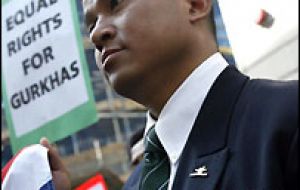MercoPress. South Atlantic News Agency
Gurkha veterans win in UK court the mother of all battles
 Some of the most loyal and battle honored warriors of the British Empire
Some of the most loyal and battle honored warriors of the British Empire The gallant Gurkha veterans of Nepal won on Monday their long court battle for the right to settle in Britain. Lawyers for the men who fought alongside British troops in battles over 200 years including the Falkland Islands in 1982 hailed the ruling.
"Today we have seen a tremendous and historic victory for Gurkha veterans. This is a victory that restores honor and dignity to deserving soldiers who faithfully served in Her Majesty's armed forces. It is a victory for common sense; a victory for fairness; and a victory for the British sense of what is 'right'". Six claimants brought a judicial review test case against the UK Government, challenging what has now been declared an unlawful immigration policy which excluded veteran Gurkhas who retired before 1997 from the United Kingdom. The Gurkhas in this test case represented approximately 2,000 others who were refused entry to the UK because the Government said they had failed to demonstrate "strong ties" to the UK. The judge, Mr Justice Blake, made clear that the long military service of these men, their wounds sustained in battle, their conspicuous acts of bravery, their acts of gallantry and their commitment and loyalty to the Crown all point to an unquestionable historic "moral debt of honor" and gratitude which the ordinary people of Britain embrace and celebrate. Martin Howe, of solicitors Howe and Co, said the case had brought "a torrential outpouring of affection and concern" from the ordinary British public towards the old warriors from the hills of Nepal. "The bonds of affection and ties of loyalty between the people of this country and the men from the Brigade of Gurkhas, who have unswervingly served this country for 200 years has never been stronger." Hundreds of Gurkhas packed the courtroom to hear Mr Justice Blake give his ruling. They were represented by five claimants, including a wounded Falklands' veteran, Lance Corporal Gyanendra Rai, 52, and Gulf War veteran Rifleman Birendra Man Shrestha, 46, along with a Gurkha widow. All had applied to settle in the UK, but were refused entry by British Entry Clearance officers at the British Embassy in Kathmandu and the British High Commissions in Hong Kong and Macau. The judge said this was an ambiguous policy that "irrationally excluded material and potentially decisive considerations that the context and the stated purpose of the policy indicate should have been included". The law was "so unclear as to permit conflicting decisions". It failed to take into account years served, whether injuries were inflicted and whether medals of valor, including the Victoria Cross, were won. In the damning ruling for the Ministry of Defence, Mr Justice Blake said its advice to the Home Office on whether to grant settlement to the Gurkhas was confusing, resulting in "irrational and unlawful" restrictions being applied. The policy needed "urgent revisiting", he said, setting a deadline of three months. The Home Office, he added, should "take political responsibility for the outcome where it is answerable to the electorate". He ordered the Home Office to pay 80% of the costs of the case. The UK government had argued that since the Gurkhas' regimental headquarters were in Hong Kong until 1997, the soldiers did not develop close enough ties to the UK. Mr Justice Blake's ruling condemned the basis of the policy that excluded the Gurkhas. "Transparency and clarity are significant requirements of instructions to immigration and entry clearance officers that are published to the world at large, generate expectations of fair treatment and bind appellate bodies in the performance of their statutory functions," he said. The government's policy either "irrationally excluded material and potentially decisive considerations" or else was so ambiguous to be misleading for both applicants and immigration officials. He compared the Gurkhas' situation to that of Commonwealth soldiers, who are automatically allowed to stay in the UK after four years' service. Another "inconsistency" was the failure of Gurkha veterans of the Falklands war to obtain visas, he said, contrasting this with the government's treatment of Falkland Islanders. It seemed "curious" for the Home Office to conclude that the Islanders were sufficiently connected with the UK to be allowed residence "but those who risked their lives and limb to bring them their freedom did not". Last year, a government review allowed Gurkhas to apply to settle under a policy known as the Armed Forces Concession, which gives a soldier serving with the British army the right to settle in Britain after four years of service anywhere in the world. For Gurkhas alone, the policy drew a line in the sand at July 1, 1997.




Top Comments
Disclaimer & comment rulesCommenting for this story is now closed.
If you have a Facebook account, become a fan and comment on our Facebook Page!